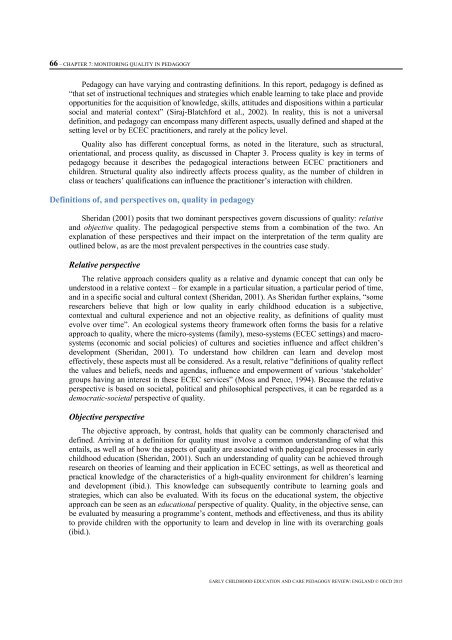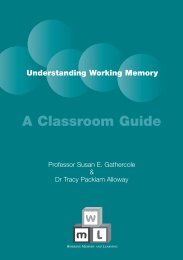early-childhood-education-and-care-pedagogy-review-england.pdf?utm_content=bufferb49b1&utm_medium=social&utm_source=twitter
early-childhood-education-and-care-pedagogy-review-england.pdf?utm_content=bufferb49b1&utm_medium=social&utm_source=twitter
early-childhood-education-and-care-pedagogy-review-england.pdf?utm_content=bufferb49b1&utm_medium=social&utm_source=twitter
Create successful ePaper yourself
Turn your PDF publications into a flip-book with our unique Google optimized e-Paper software.
66 – CHAPTER 7: MONITORING QUALITY IN PEDAGOGYPedagogy can have varying <strong>and</strong> contrasting definitions. In this report, <strong>pedagogy</strong> is defined as“that set of instructional techniques <strong>and</strong> strategies which enable learning to take place <strong>and</strong> provideopportunities for the acquisition of knowledge, skills, attitudes <strong>and</strong> dispositions within a particularsocial <strong>and</strong> material context” (Siraj-Blatchford et al., 2002). In reality, this is not a universaldefinition, <strong>and</strong> <strong>pedagogy</strong> can encompass many different aspects, usually defined <strong>and</strong> shaped at thesetting level or by ECEC practitioners, <strong>and</strong> rarely at the policy level.Quality also has different conceptual forms, as noted in the literature, such as structural,orientational, <strong>and</strong> process quality, as discussed in Chapter 3. Process quality is key in terms of<strong>pedagogy</strong> because it describes the pedagogical interactions between ECEC practitioners <strong>and</strong>children. Structural quality also indirectly affects process quality, as the number of children inclass or teachers’ qualifications can influence the practitioner’s interaction with children.Definitions of, <strong>and</strong> perspectives on, quality in <strong>pedagogy</strong>Sheridan (2001) posits that two dominant perspectives govern discussions of quality: relative<strong>and</strong> objective quality. The pedagogical perspective stems from a combination of the two. Anexplanation of these perspectives <strong>and</strong> their impact on the interpretation of the term quality areoutlined below, as are the most prevalent perspectives in the countries case study.Relative perspectiveThe relative approach considers quality as a relative <strong>and</strong> dynamic concept that can only beunderstood in a relative context – for example in a particular situation, a particular period of time,<strong>and</strong> in a specific social <strong>and</strong> cultural context (Sheridan, 2001). As Sheridan further explains, “someresearchers believe that high or low quality in <strong>early</strong> <strong>childhood</strong> <strong>education</strong> is a subjective,contextual <strong>and</strong> cultural experience <strong>and</strong> not an objective reality, as definitions of quality mustevolve over time”. An ecological systems theory framework often forms the basis for a relativeapproach to quality, where the micro-systems (family), meso-systems (ECEC settings) <strong>and</strong> macrosystems(economic <strong>and</strong> social policies) of cultures <strong>and</strong> societies influence <strong>and</strong> affect children’sdevelopment (Sheridan, 2001). To underst<strong>and</strong> how children can learn <strong>and</strong> develop mosteffectively, these aspects must all be considered. As a result, relative “definitions of quality reflectthe values <strong>and</strong> beliefs, needs <strong>and</strong> agendas, influence <strong>and</strong> empowerment of various ‘stakeholder’groups having an interest in these ECEC services” (Moss <strong>and</strong> Pence, 1994). Because the relativeperspective is based on societal, political <strong>and</strong> philosophical perspectives, it can be regarded as ademocratic-societal perspective of quality.Objective perspectiveThe objective approach, by contrast, holds that quality can be commonly characterised <strong>and</strong>defined. Arriving at a definition for quality must involve a common underst<strong>and</strong>ing of what thisentails, as well as of how the aspects of quality are associated with pedagogical processes in <strong>early</strong><strong>childhood</strong> <strong>education</strong> (Sheridan, 2001). Such an underst<strong>and</strong>ing of quality can be achieved throughresearch on theories of learning <strong>and</strong> their application in ECEC settings, as well as theoretical <strong>and</strong>practical knowledge of the characteristics of a high-quality environment for children’s learning<strong>and</strong> development (ibid.). This knowledge can subsequently contribute to learning goals <strong>and</strong>strategies, which can also be evaluated. With its focus on the <strong>education</strong>al system, the objectiveapproach can be seen as an <strong>education</strong>al perspective of quality. Quality, in the objective sense, canbe evaluated by measuring a programme’s content, methods <strong>and</strong> effectiveness, <strong>and</strong> thus its abilityto provide children with the opportunity to learn <strong>and</strong> develop in line with its overarching goals(ibid.).EARLY CHILDHOOD EDUCATION AND CARE PEDAGOGY REVIEW: ENGLAND © OECD 2015



